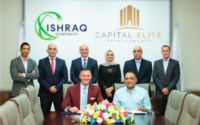Green Finance Offers Over 1 Million GCC Jobs And A $2 Trillion GDP Boost
By developing the right structure and mechanisms for green finance, GCC governments have the potential to unlock $2 trillion in cumulative GDP contribution, more than 1 million jobs and foreign direct investment in sustainable industries, according to Strategy&, Middle East, part of the PwC network.
While all GCC countries have already begun their respective sustainability journeys, policymakers must act decisively and in a differentiated manner to capture the largest share of the economic prize. The report, entitled Middle East Green Finance: A $2 Trillion Opportunity,advises governments to focus on four priorities: enact policies that promote environmental sustainability in all industries, create a green sovereign wealth fund, strengthen capital markets, and develop standardized and transparent reporting mechanisms for environmental performance.
Aurelien Vincent, Partner with Strategy& Middle East, said: “Investors around the world are pouring
capital into projects with a strong environmental, social, and governance (ESG) angle. Our analysis has found that green investments in six key GCC industries could have a profound socioeconomic impact that has the potential to create over 1 million skilled jobs and turbocharge foreign direct investment in highly sustainable industries.”
Commenting on the nature of the region’s renewable energy and project financing opportunities, Anthony Yammine, Principal with Strategy& Middle East, said: “GCC countries have some of the highest solar exposures in the world. A solar-photovoltaic panel in a GCC country produces twice as much output as it would in Germany or any climatically similar European country – 1,750 to 1,930 hours of full-load operation per year. We can also identify clear opportunities in green hydrogen where production technologies are easily accessible, reducing barriers to entry.
Based on our global supply and demand analysis, exporting countries can potentially capture a market of approximately 200 million tons of green hydrogen by 2050, worth $300 billion yearly. The green hydrogen export market can also create 400,000 operations and maintenance jobs.”
To quantify the benefits of green investing in terms of economic diversification and growth, we looked at six major non-oil sectors in the GCC, including power, water, construction, mobility, food, and waste management. We estimate that the cumulative GDP contribution of these sectors can reach $2 trillion through 2030. With the expansion of these sectors, we estimate they could add over 1 million jobs by 2030.
That is a significant opportunity that GCC governments can grasp through four strategic moves.
Promoting environmental sustainability
Governments should enact policies that promote environmental sustainability in all industries,including incentives, market mechanisms, and standards. Market mechanisms such as fees on carbon, plastic, and other materials with harmful environmental impacts provide a true costof a company or industry’s activities. Incentives in renewable energy usage and electric vehicles can boost adoption. Governments also need to continually update regulatory standards for emissions, recycling, and building codes to ensure the economy is keeping pace with advances in innovation and technology.
Creating a green sovereign wealth fund
Each GCC government should create a green sovereign wealth fund. This organization should have the credibility and capabilities to engage with and attract international investors. The green sovereign wealth fund should not be beholden to the region’s legacy mindset regarding sustainability, which treats it as a cost burden rather than an opportunity. Establishing a green sovereign wealth fund will unlock substantial benefits to all stakeholders, including the public sector, investors, developers, and the general public.
Strengthening capital markets
GCC governments should continue opening up and strengthening the region’s capital markets.
Building up these capital markets will allow investors to exit successful investments easily. In addition, it will help investors access GCC funds, such as those held by high-net-worth individuals and families.Governments can take several steps to build local capital markets. They can increase the number of attractive, sustainable investment opportunities by privatizing—either partially or preferably fully—assets across the region, drawing international retail and institutional investors.Governments can also increase the demand among local retail investors by incentivizing stock market investments in the region.
Developing standardized and transparent reporting mechanisms for environmental performance
GCC governments must build comprehensive, standardized, and transparent reporting systems for green finance. Clear measurement and reporting mechanisms are a complex challenge for sustainability initiatives worldwide. Investors are demanding information of higher quantity and quality, yet companies are not obligated to disclose ESG achievements. When they do, they often adopt globally fragmented standards, making objective comparisons difficult. Another challenge stems from a lack of data reliability and verification due to self-assessment and reporting.








 Email: info@cyber-gear.com
Email: info@cyber-gear.com